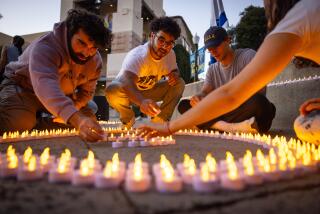Kent State Dedicates Anti-War Memorial
- Share via
KENT, Ohio — About 4,000 people gathered in the rain today at Kent State University to hear calls for reconciliation at the dedication of a memorial to four students killed and nine wounded in an anti-war protest 20 years ago.
“We do appreciate what has been done and who did it,” said Florence Schroeder, mother of Bill Schroeder, one of the four students killed by Ohio National Guardsmen on May 4, 1970.
She said she is convinced that the death of her son and three other students helped shorten the Vietnam War by increasing public opposition to American involvement in it.
“He absolutely did not die in vain,” Schroeder’s mother said at a news conference before the midday dedication.
The $100,000 granite memorial is the most ambitious attempt by the university to commemorate the dead and wounded. But student activists who wanted a larger memorial built and more student involvement in its planning waged a silent protest march during the dedication.
The approximately 200 students stood near the white tent, where ceremony participants spoke. Some of the students held up their arms, fists clenched or displaying the peace sign, and many others held up handmade signs reading “Whose May 4th Is It Anyway?” and “Don’t Minimize Student Death.”
Thursday evening, about 2,000 people attended a candlelight ceremony to mark the deaths of Schroeder, Jeffrey Miller, Sandy Scheuer and Allison Krause.
Gov. Richard F. Celeste said the 1970 shootings should serve as a source of learning rather than as a focus of bitterness.
“To those who suffered from that tragedy 20 years ago, I am sorry,” Celeste said. “It’s time to turn the tragedy at Kent State of May 4, 1970, into a calling to peacemakers.”
Former Sen. George S. McGovern, keynote speaker at the dedication, called the shootings “the most tragic episode in American foreign policy history.”
McGovern called for U.S. reconciliation with Vietnam and the re-establishment of diplomatic ties.
“The war in Vietnam is unfinished,” he said. “The killing has stopped but the arrogance that produced it survives and so does the agony, the guilt and the separation.”
Until now, the shootings were marked only by a gravestone-size slab erected in 1971.
More to Read
Sign up for Essential California
The most important California stories and recommendations in your inbox every morning.
You may occasionally receive promotional content from the Los Angeles Times.













